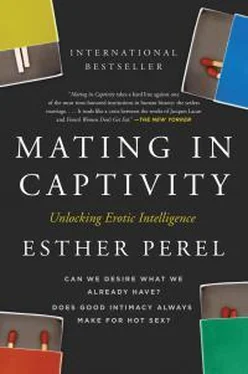For those who aspire to accelerate their heartbeat periodically, I give them the score: excitement is interwoven with uncertainty, and with our willingness to embrace the unknown rather than to shield ourselves from it. But this very tension leaves us feeling vulnerable. I caution my patients that there is no such thing as “safe sex.”
I should point out, however, that not all lovers seek passion, or even, at one time, basked in it. Some relationships originate in feelings of warmth, tenderness, and nurturance, and the partners choose to remain in these calmer waters. They prefer a love that is built on patience more than on passion. To them, finding serenity in a lasting bond is what counts. There is no one way, and there is no right way.
Mating in Captivity aspires to engage you in an honest, enlightened, and provocative discussion. It encourages you to question yourself, to speak the unspoken, and to be unafraid to challenge sexual and emotional correctness. By flinging the doors open on erotic life and domesticity, I invite you to put the X back in sex.
1
From Adventure to Captivity
Why the Quest for Security Saps Erotic Vitality
The original primordial fire of eroticism is sexuality; it raises the red flame of eroticism, which in turn raises and feeds another flame, tremulous and blue. It is the flame of love and eroticism. The double flame of life.
—Octavio Paz, The Double Flame
PARTIES IN NEW YORK CITYare like anthropological field trips—you never know whom you’ll meet or what you’ll find. Recently I was milling around a self-consciously hip event, and, as is typical in this city of high achievers, before being asked my name I was asked what I do. I answered, “I’m a therapist, and I’m writing a book.” The handsome young man standing next to me was also working on a book. “What are you writing about?” I asked him. “Physics,” he answered. Politely, I mustered the next question, “What kind of physics?” I can’t remember what his answer was, because the conversation about physics ended abruptly when someone asked me, “And you? What’s your book about?” “Couples and eroticism,” I answered.
Never was my Q rating as high—at parties, in cabs, at the nail salon, on airplanes, with teenagers, with my husband, you name it—as when I began writing a book about sex. I realize that there are certain topics that chase people away and others that act like magnets. People talk to me. Of course, that doesn’t mean they tell me the truth. If there’s one topic that invites concealment, it’s this one.
“What about couples and eroticism?” someone asks.
“I’m writing about the nature of sexual desire,” I reply. “I want to know if it’s possible to keep desire alive in a long-term relationship, to avoid its usual wear.”
“You don’t necessarily need love for sex, but you need sex in love,” says a man who’s been standing on the sidelines, still undecided about which conversation to join.
“You focus mainly on married couples? Straight couples?” another asks. Read: is this book also about me? I reassure him, “I’m looking at myriad couples. Straight, gay, young, old, committed, and undecided.”
I tell them I want to know how, or if, we can hold on to a sense of aliveness and excitement in our relationships. Is there something inherent in commitment that deadens desire? Can we ever maintain security without succumbing to monotony? I wonder if we can preserve a sense of the poetic, of what Octavio Paz calls the double flame of love and eroticism.
I’ve had this conversation many times, and the comments I heard at this party were hardly novel.
“Can’t be done.”
“Well, that’s the whole problem of monogamy, isn’t it?”
“That’s why I don’t commit. It has nothing to do with fear. I just hate boring sex.”
“Desire over time? What about desire for one night?”
“Relationships evolve. Passion turns into something else.”
“I gave up on passion when I had kids.”
“Look, there are men you sleep with and men you marry.”
As often happens in a public discussion, the most complex issues tend to polarize in a flash, and nuance is replaced with caricature. Hence the division between the romantics and the realists. The romantics refuse a life without passion; they swear that they’ll never give up on true love. They are the perennial seekers, looking for the person with whom desire will never fizzle. Every time desire does wane, they conclude that love is gone. If eros is in decline, love must be on its deathbed. They mourn the loss of excitement and fear settling down.
At the opposite extreme are the realists. They say that enduring love is more important than hot sex, and that passion makes people do stupid things. It’s dangerous, it creates havoc, and it’s a weak foundation for marriage. In the immortal words of Marge Simpson, “Passion is for teenagers and foreigners.” For the realists, maturity prevails. The initial excitement grows into something else—deep love, mutual respect, shared history, and companionship. Diminishing desire is inescapable. You are expected to tough it out and grow up.
As the conversation unfolds, the two camps eye each other with a complex alloy of pity, tenderness, envy, exasperation, and outright scorn. But while they position themselves at opposite ends of the spectrum, both agree with the fundamental premise that passion cools over time.
“Some of you resist the loss of intensity, some of you accept it, but all of you seem to believe that desire fades. What you disagree on is just how important the loss really is,” I comment. Romantics value intensity over stability. Realists value security over passion. But both are often disappointed, for few people can live happily at either extreme.
Invariably, I’m asked if my book offers a solution. What can people do? Hidden behind this question looms a secret longing for the élan vital, the surge of erotic energy that marks our aliveness. Whatever safety and security people have persuaded themselves to settle for, they still very much want this force in their lives. So I’ve become acutely attuned to the moment when all these ruminations about the inevitable loss of passion turn into expressions of hope. The real questions are these: Can we have both love and desire in the same relationship over time? How? What exactly would that kind of relationship be?
The Anchor and the Wave
Call me an idealist, but I believe that love and desire are not mutually exclusive, they just don’t always take place at the same time. In fact, security and passion are two separate, fundamental human needs that spring from different motives and tend to pull us in different directions. In his book Can Love Last? the infinitely thoughtful psychoanalyst Stephen Mitchell offers a framework for thinking about this conundrum. As he explains it, we all need security: permanence, reliability, stability, and continuity. These rooting, nesting instincts ground us in our human experience. But we also have a need for novelty and change, generative forces that give life fullness and vibrancy. Here risk and adventure loom large. We’re walking contradictions, seeking safety and predictability on one hand and thriving on diversity on the other.
Ever watch a child run away to explore and then run right back to make sure that Mom and Dad are still there? Little Sammy needs to feel secure in order to go into the world and discover; and once he has satisfied his need for exploration, he wants to go back to his safe base to reconnect. It’s a sport he’ll come back to as an adult, culminating in the games of eros. Periods of being bold and taking risks will alternate with periods of seeking grounding and safety. He may fluctuate, though he’ll generally settle on one preference over another.
Читать дальше










